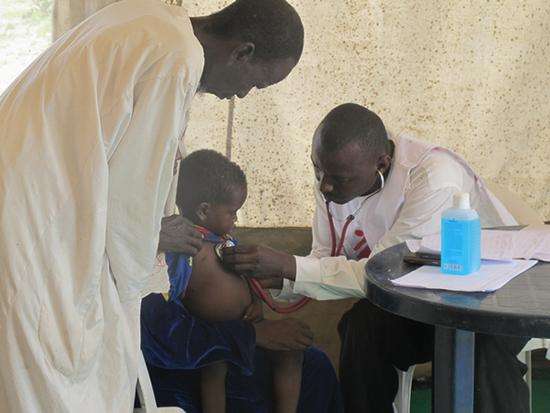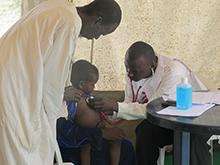MSF teams in Chad are simultaneously responding to a spike in malaria cases and carrying out a prevention campaign that has thus far had very encouraging results.
At the same time as Doctors Without Borders/Médecins Sans Frontières (MSF) has been responding to an acute peak of new cases of malaria in Chad, teams have seen some very encouraging initial results from a prevention campaign in the south of the country that reduced the caseload in the region by up to 70 percent—a great sign in the fight against a disease that kills more children in Chad than anything else.
Treating New Cases
In Am Timan, in southeastern Chad, and in Massakory, in the west, MSF staff has treated more than 40,000 new malaria cases since July. “In Massakory hospital, we admit between 20 and 40 malaria patients each day,” says Letizia Becca, MSF medical coordinator in Chad.
“In addition to a great increase of cases, their severity is indeed worrying, for adults and teenagers—something I had never seen before—as well as for children who remain the hardest-hit [group].”
Malaria can be particularly lethal when it occurs simultaneously with another disease, such as acute malnutrition. Malaria, in fact, leaves victims especially vulnerable to malnutrition, and vice-versa. That makes prompt treatment necessary, and MSF is working to both provide it and spread the word that it is available.
“My son is 6 months old,” said a woman named Florence in MSF’s malaria unit in Moissala. “When MSF nurses came to our village, they told me that if my son gets fever, it can be because of mosquito bites. So when my child fell sick, I brought him to the health center and they directed me here. Now my son is better and I’m relieved”.
In addition to treating patients, MSF has been supplying medicines and rapid diagnostic tests to health centers, running mobile clinics to reach remote areas, and conducting sensitization and awareness campaigns through community radio stations.
Encouraging Results from a Prevention Campaign
At the same, other teams are carrying out something called seasonal malaria chemoprophylaxis (SMC), which has proven effective in Chad and other countries when it comes to preventing people from contracting malaria in the first place. SMC involves giving five oral anti-malaria medicines to children during the time of year when the risk of transmission is the highest.
This year, teams administered these medications to roughly 50,000 children in southern Chad, and in the days that followed, they observed a dramatic decrease—70 percent—of malaria cases in the treatment areas.
“SMC reduces the number and the severity of malaria episodes for children and prevents them from sinking into a critical and potentially lethal state,” explained Alain Camp, MSF head of mission in Chad. “A fall of 70 percent of malaria cases in less than a week after the distribution of the treatment—it’s spectacular and very encouraging.”
Equally encouraging is the fact that Chad’s own national program against malaria implemented this strategy in four districts this year. MSF urges the government to expand SMC services throughout the country, and calls on donors to support Chad’s Ministry of Health and its partners by making SMC a priority for their funding efforts against malaria going forward.
MSF has been working in Chad for more than 30 years and currently has regular programs in Abéché, Am Timan, Massakory, and Moissala. Seasonal malaria chemoprophylaxis has also been implemented by MSF in other parts of Chad, as well as in Mali and Niger.





